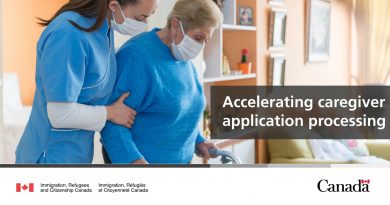Program Requirements: In-Home Caregiver – Temporary Foreign Worker Program (TFWP)
Note: This requirement does not apply to employers of high-wage in-home caregivers.
Housing
Employers cannot require a caregiver to live in their home. However, if an employer and foreign caregiver decide that a live-in arrangement is the most suitable, for the needs of the person requiring care or to assist the TFW, there are certain criteria that must be met. Specifically, employers must ensure the:
- accommodation is being provided in the home of the person receiving care
- accommodation is private and furnished bedroom
- bedroom door has a lock and safety bolt on the inside
- bedroom meets the municipal building requirements and the provincial/territorial health standards
- foreign caregiver is not charged room and board for the accommodations, as per the policy, under the TFWP
Employers must complete the Bedroom description section of the LMIA application form.
Employers of low-wage in-home caregivers, who are not providing live-in accommodations, must ensure that suitable and affordable accommodation is available to the TFW. In addition, these employers should be prepared to provide proof (for example, newspaper ads) that affordable housing is available in the community where the TFW will be employed. Meanwhile, employers of high-wage in-home caregivers do not have to meet this requirement.
Ministerial instruction – Refusal to process an application
As a result of public policy considerations as determined in Ministerial Instructions, the TFWP may refuse to process LMIA applications received on or after December 1, 2014 from employers seeking to hire in-home caregivers exclusively on a live-in basis.
Health and workplace safety
Health insurance
Employers of low-wage in-home caregivers must always pay for the TFW’s private health insurance. Coverage must begin from the time the TFW arrives in Canada until the worker is covered by the appropriate provincial/territorial health insurance plan. The waiting period to be eligible for the provincial/territorial health insurance is available on the Ministry of Health websites for each province or territory. The private insurance coverage provided to the TFW must be similar to the provincial/territorial health insurance plan.
Note: Under no circumstances, can an employer recover the health insurance costs from the TFW.
Workplace safety
Employers must always ensure that the TFWs they want to hire under the TFW Program are covered from the provincial/territorial workplace safety insurance provider, where required by law. In provinces/territories where the provincial/territorial legislation allows employers the flexibility to opt for a private insurance plan, employers must ensure:
- that any private plan chosen provides the same level of compensation to that offered by a province/territory (for example, must provide the same or better coverage than that offered by the province/territory)
- that all employees on the worksite are covered by the same provider
Employers enquiring about private insurance plan equivalency should contact the provincial/territorial workplace safety authority.
The coverage purchased by the employer must correspond with the TFWs’ first day of work in Canada and the costs must not be recovered from the TFWs.
Employment contract
All employers of in-home caregivers must prepare and sign an employment contract. Although employers are not required to use the contract template provided, they must ensure that the contract used, contains all of the mandatory information and clauses. For positions in the province of Quebec, the Ministère de l’Immigration, de la Diversité et de l’Inclustion (MIDI) has its own requirements concerning the employment contract between an employer and a worker providing in-home care.
In the event that differences arise between the employer and the TFW, the contract will guide the resolution of disputes. In cases where the dispute cannot be resolved between the two parties, the employer or the TFW may contact the Ministry of Labour in the province/territory where the work is being performed.
ESDC/Service Canada has no authority to intervene in the employer-employee relationship or to enforce the terms and conditions of the contract.
Third-parties
Employers do not need to use the services of a third-party representative to apply for a foreign worker. However, employers who choose to use the services of one of these individuals or organizations must pay for all of the fees associated with the service and meet all of the applicable requirements.
Representatives assist employers by providing services, such as:
- explaining and providing advice on the TFWP
- completing and submitting the application form and all required documents
- communicating with ESDC/Service Canada on the employer’s behalf
- representing the employer during the application process
Employers who wish to use the services of a third-party representative, paid or unpaid, must complete the appropriate section of the LMIA application form. Employers must identify their representative and not simply the firm/organization employing this person.
Paid representatives
Individuals representing or assisting employers in exchange for compensation (for example, money, goods or services) must be authorized under section 91 of the Immigration and Refugee Protection Act (IRPA), which means they have to be a member in good standing with:
- a Canadian provincial/territorial law society, or a student-at-law under its supervision
- the Chambre des notaires du Québec
- the Province of Ontario’s law society as a paralegal
- the Immigration Consultants of Canada Regulatory Council (ICCRC)
Employers should visit Immigration, Refugees and Citizenship Canada (IRCC) to verify that a specific representative is authorized to represent them or provide immigration advice.
Unpaid representatives
Individuals representing employers for free (for example, do not collect fees or other forms of compensation) are not subject to any restrictions under the IRPA. These individuals are usually family members, non-for-profit or religious organizations that assist employers who may not be able to complete the application process on their own.





